For the past two years, we’ve been blitzed with propaganda about the pandemic, and now we’re being bombarded with headlines about the war in Ukraine. Perhaps we have reasons to be skeptical of the narrative being pushed?
Remember the war in Iraq? At the time, we were sold fabrications that linked Saddam Hussein with 9/11, al-Qaeda, and weapons of mass destruction (WMDs).
If we are to avoid getting hoodwinked again, we should learn from the past.
Let’s revisit what happened back then, and compare it to what’s been going on now.
Tracing back the agenda
The Bush administration had led the public to believe that the reason for the Iraq War had something to do with 9/11 and WMDs, but reporters failed to notice that hints of an Iraq agenda had been made public long before 9/11.
Key elements of the agenda were made public as far back as 1992, when Paul Wolfowitz, who was then working under the administration of George H. W. Bush (Bush Senior), oversaw the drafting of a policy proposal called the “Defence Planning Guidance” or DPG. Dick Cheney, then Secretary of Defense, was also closely involved.
The DPG, which was internal to military leaders and the Defense Department, got leaked to the media. It laid out an objective within the Middle East and Southwest Asia “to remain the predominant outside power in the region and preserve access to the region’s oil” and spoke of the need to “prevent a hegemon or alignment of powers from dominating the region” (p. 12 in this pdf).
In 1997, Bill Kristol and Robert Kagan would found a neocon think tank called Project for the New American Century (PNAC). PNAC’s first act was to release a “statement of principles,” which described the U.S. as the “world’s preeminent power,” and suggested that U.S. foreign policy should “shape a new century favorable to American principles and interests.” It also called for significant increases in defense spending.
Of the twenty-five people to sign the founding principles, which included Jeb Bush, ten would go on to serve in the administration of George W. Bush, including Wolfowitz, Cheney and Donald Rumsfeld.
In 1998, these same people were writing letters to the Clinton administration calling for Saddam’s removal (see here and here), and the founders of PNAC were openly advocating for regime change in Iraq; “Saddam Hussein must go.”
They would have to wait till the George W. Bush presidency to get what they wanted.
The narrative that was sold to us
Just one day after the attacks on September 11, 2001, various PNAC members were giving interviews, linking the attacks to the Iraqi government, or calling for immediate military action in the Middle East, even in Palestine.
Members of PNAC also wrote editorials calling for the end of Saddam Hussein (examples here and here). For more on PNAC’s role in the propaganda campaign for war, see here.
On Jan. 29, 2002, President George W. Bush gave his famous “Axis of Evil” speech, which painted Iraq as part of a trifecta of evil nations that posed a grave danger:
Iraq continues to flaunt its hostility toward America and to support terror. The Iraqi regime has plotted to develop anthrax, and nerve gas, and nuclear weapons for over a decade.
On August 26, 2002, Vice President Dick Cheney said:
Simply stated, there is no doubt that Saddam Hussein now has weapons of mass destruction.
“We don't want the smoking gun to be a mushroom cloud,” said Condoleezza Rice, on Sep. 8. 2002.
It’s estimated that Bush and seven of his administration's top officials, including Dick Cheney, Condoleezza Rice, and Donald Rumsfeld, made at least 935 false statements in the two years following the 9/11 attack.
You can read more about the lies here and here, and for quotes on who said what when, see here.
On March 17, 2003, just a few days before we would invade Iraq, Bush addressed the nation:
Intelligence gathered by this and other governments leaves no doubt that the Iraq regime continues to possess and conceal some of the most lethal weapons ever devised.
On March 20, 2003, the U.S. invaded Iraq. The war would last until 2011.
What we’ve learned
There have been many revelations that have since come out about the war. I’ll just cover some of less controversial ones.
These were the various assurances the Bush administration had made about how the war would unfold:
We all know how that turned out.
For one, we never did find those WMDs.
Numerous bipartisan government investigations, including those by the Senate Select Committee on Intelligence (2004 and 2006), the 9/11 Commission, and the multinational Iraq Survey Group, concluded that Iraq did not possess any WMDs.
Testimonials from insiders and intelligence officers
We also have testimonials from intelligence officers or insiders within the Bush administration whose accounts form a picture of a very calculated, 18-month, orchestrated, cynical campaign of lies that was used to sell the war.
The Veteran Intelligence Professionals for Sanity was a group of 35 retired and resigned high-level U.S. intelligence operatives that had come together to debunk the Bush administration’s claims on WMDs.
In a 2004 interview, one of its members, former CIA agent Ray McGovern, recounts how they came together:
We established our group, Veteran Intelligence Professionals for Sanity, in January of last year. Before that several of us had been writing op-eds, and we had been giving each other sanity checks, because the conclusions we were coming up with were pretty far out — that the President and the Secretary of State were lying through their teeth.
Asked why he was speaking out:
Because there is no English word to describe our outrage. We’ve been watching this for a year now, and we’ve published eleven memos on what the Bush administration has done. We’re just aghast at what we saw all during 2002.
We have never seen anything like this orchestrated campaign, as the Administration chose to play on America’s real suffering and trauma to sell an illegal and unnecessary war.
McGovern also claimed that George Tenet, former director of the CIA, cooked up intelligence to fit the narrative that Bush and Cheney wanted.
Tenet, who was largely blamed for bad intelligence that had led to the war, has tried to come out and defend his performance. In 2007 he wrote a book where he claimed that Cheney and other officials had pushed for invasion without ever conducting a “serious debate” about whether Hussein posed an imminent threat.
Greg Thielmann, who had been at the State Department, recounted how in 2002 all their weapons intelligence experts at the time had agreed that the intelligence to support the claim that Hussein was trying to acquire uranium from Africa, was bad.
And yet a year later, he was aghast to hear Bush bring it up in his 2003 State of the Union Address.
Bush had said:
The British government has learned that Saddam Hussein recently sought significant quantities of uranium from Africa.
Our intelligence sources tell us that he has attempted to purchase high-strength aluminum tubes suitable for nuclear weapons production.
According to Thielmann:
They already had their conclusion to start out with, and they were cherry picking the information that we provided to use whatever pieces of it that fit their overall interpretation. Worse than that, they were dropping qualifiers and distorting some of the information we provided to make it seem more alarmist and more dangerous than the information we were giving them.
And:
It's very hard for me to think of any example of systematic, across-the-board exaggeration and misleading statements about an important war and peace subject. Nothing quite matches what I've seen in the Iraqi WMD area in the last couple of years.
Paul Pillar, who spent about 30 years at the CIA, made similar accusations; that “intelligence was misused publicly to justify decisions already made,” and former Treasury Secretary Paul O'Neill said that Bush had planned for the Iraqi invasion before 9/11.
U.S. Diplomat John Brady Kiesling said the following in his letter of resignation:
We spread disproportionate terror and confusion in the public mind, arbitrarily linking the unrelated problems of terrorism and Iraq. The result, and perhaps the motive, is to justify a vast misallocation of shrinking public wealth to the military and to weaken the safeguards that protect American citizens from the heavy hand of government. September 11 did not do as much damage to the fabric of American society as we seem determined to do to ourselves.
The Brits also knew
The U.K. joined the U.S. in the war in Iraq. A series of leaked documents from 2005-2016 showed that the Prime Minister of England, Tony Blair and his administration, knew full well that the intelligence did not support invading Iraq.
The Downing street memo, leaked by The Sunday Times on May 1, 2005, contained the minutes of a meeting between Blair and his top security officials. It revealed, among other things, that “intelligence and facts were being fixed around the policy.”
Newspapers in the U.S. were slow to cover the story (see here, here, and here). It did not get printed in The Washington Post until two weeks later, and in The New York Times it got printed three weeks later, buried deep inside the paper.
In 2016, a British inquiry called the Chilcot report made various communications between British and American officials public.
It showed that Blair had been advised that the war would increase terror threats in the UK. It also showed how the Brits cooked up a series of intelligence “dossiers” purporting to show Iraq as a unique threat. In its initial drafts, it had mentioned Libya, North Korea, Iran, and Iraq as countries with weapons, to which Foreign Secretary Jack Straw suggested:
“Good, but should not Iraq be first and also have more text? The paper has yet to show why there is an exceptional threat from Iraq. It does not quite do this yet.”
Sir John Scarlett, chairman of Britain’s Joint Intelligence Committee suggested:
You may still wish to consider whether more impact could be achieved if the paper only covered Iraq. This would have the benefit of obscuring the fact that in terms of the WMD, Iraq is not that exceptional.
Tim Dowse, head of counter-proliferation at the Foreign and Commonwealth Office suggested ways to get around what he called “the presentational difficulty” in making the case for war:
If it appears we do have to change our public line, I wonder if we might finesse the presentational difficulty by changing the terms? Instead of talking about tonnes of precursor chemicals (which don’t mean much to the man in the street anyway), could we focus on munitions and refer to ‘precursor chemicals sufficient to produce x thousand SCUD warheads/aerial bombs/122mm rockets filled with mustard gas/the deadly nerve agents…
He added (emphasis mine):
I realise that this would not in the end hoodwink a real expert… But the task… would be impossible for a layman. And the result would, I think, have more impact on the target audience.
We now know that they had serious doubts that their efforts at hiding “regime change” would cut it. Foreign Office communications chief John Williams thought the dossier was “unlikely to be enough… There is no ‘killer fact’ that proves Saddam must be taken on now.”
He suggested that they “reinforce the broad case so that it strikes a chord with more and more people, as opposed to journalists,” and said:
Our target is not the argumentative interviewer or opinionated columnist, but the kind of people to whom ministerial interviewers are a background hum on the car or kitchen radio…
Anthrax
Recall that just one week after 9/11, we had a series of anthrax attacks, which would occur over the course of several weeks.
The Bush administration tried to pressure the FBI to blame the anthrax attacks on al-Qaeda. The FBI concluded, however, that the anthrax came from a U.S. military lab in Fort Detrick, Maryland.
Ultimately the attacks would be blamed on Bruce E. Ivins, a biodefense researcher, but he conveniently committed suicide before the FBI was able to press charges against him. Many scientists have said that he didn’t have the skills to turn anthrax into an inhalable powder.
We still don’t know for sure who was behind the attacks, but it definitely didn’t come from Iraq or al-Qaeda. That didn’t stop the administration from using the anthrax attacks to get us into war; see here or here.
The almost unanimous support from the media
Unfortunately, in the lead up to the war, almost the entire media unquestioningly accepted what was coming out of the Bush administration.
The New York Times played a key role in spreading the Iraq war gospel.
On September 8, 2002, Judith Miller and Michael Gordon of The New York Times published their now infamous “aluminum tubes” article where they claimed Iraq had sought to buy aluminum tubes intended as components of centrifuges to enrich uranium:
Conveniently, Dick Cheney went on Meet the Press later that day to talk about what had been extremely classified information up until that day when it had appeared in The New York Times:
There’s a story in The New York Times this morning-this is-I don’t-and I want to attribute The Times. I don’t want to talk about, obviously, specific intelligence sources, but it’s now public that, in fact, he has been seeking to acquire, and we have been able to intercept and prevent him from acquiring through this particular channel, the kinds of tubes that are necessary to build a centrifuge.
“Aluminum tubes” would become a central talking point for the Bush administration’s case for war.
Among the many opinion writers and editors who got the Iraq war blatantly wrong were Jonathan Chait, previously at The New Republic and now at New York magazine, Jeffrey Goldberg, then writing for Slate and The New Yorker and now editor-in-chief of The Atlantic, David Remnick of The New Yorker, Fred Hiatt who was at The Washington Post, Thomas Friedman and David Brooks of The New York Times.
One major news organization went against the grain: the Knight-Ridder newspaper chain.
When asked how they had avoided getting “lost in the same wave of reporting that overtook the rest of the press corps” they said:
There wasn't any reporting in the rest of the press corps, there was stenography.
The administration would make an assertion, people would make an assertion, people would write it down as if it were true, and put it in the newspaper or on television.
I suggest you count how many times articles just quote sources that are synonyms of “officials say.” You start to realize it often makes up the bulk of a lot of “reporting” these days.

Matt Taibbi, in his book about the media, Hate Inc, says it’s not just that journalists act as stenographers:
The real crime is absorbing the ideas of powerful people (often crafted by groups of officials in a dreary corporate process) and repeating them as if they’re your own personal thoughts.
And on groupthink:
There’s a fear of losing one’s place. Reporters in large commercial organizations make mistakes as a group because they do everything as a group: they’re always amplifying each other’s messages, which means a tacit agreement to trust others in a wide social group that includes high-level sources, advertisers, and other influential players.
For more on Iraq War propaganda, and comparisons to how networks in other countries were covering the war, see here.
Collective amnesia
The media
Despite having failed colossally, the media largely got away with their horrendous performance on their Iraq war coverage.
As Taibbi described it in Hate Inc:
As time passed, these media figures used an array of tricks to massage the scale of error out of public memory. Aspects of the WMD affair aren’t even seen as mistakes in hindsight because the propaganda campaign was so far-reaching it made them invisible.
Many have made various excuses for having gotten it so wrong, like David Remnick of The New Yorker in 2006:
But I will say this, on the WMD question before the war, nobody got that story completely right.
Except for the writers at the Knight-Ridder newspaper. And Bob Simon, a correspondent for 60 Minutes. There were also some within corporate media who were against the war, and silenced, like Jesse Ventura, whose silence was bought, and Phil Donahue, who was fired.
I’m sure there were others we don’t know about.
And let’s not forget the millions of people who had protested the war. They might not have disbelieved the WMD claims, but they had suspected that there was something wrong with the official narrative.
Bush’s spectacular reputation revival
For those who have forgotten, Bush was despised and continually ridiculed while he was president. He was the Donald Trump of the era. And although he enjoyed a bump in popularity shortly after 9/11, by the time he left office in 2009 he had a job approval of between 24-34% in national polls.
In the years since, Bush has nearly doubled his popularity. Even Obama praised him in his 2020 book.
Today he’s seen by many as an avuncular fellow who likes to spend time painting. In 2021 he came out with a book of portraits that celebrate America’s immigrants. How nice and not war crime-y.
As for Dick Cheney, I’m not sure he will ever be seen as “avuncular,” as he was akin to Darth Vader during Bush’s presidency, but lately some progressives have “appreciated” him for being against Trump (see here and here). And according to this article in The Atlantic, we need a reminder of “the many reasons why the vast majority of Americans disapproved of his tenure.”
More revivals: From neoconnery to liberal media punditry
There’s a very simple formula for how to revive the reputation of a neocon who’s linked to a fraudulent and deeply unpopular war.
Take 1 neocon, add avid anti-Trump professions OR write 1 big anti-Trump book, and Presto! Get embraced by the liberal media.
Exhibit A: David Frum, who was a speechwriter for George W. Bush, came up with “Axis of Evil.” He’s since written a book called Trumpocalypse: Restoring American Democracy. He’s now a staff writer at The Atlantic.
Exhibit B: Remember Bill Kristol, one of the founding members of the neocon think tank PNAC? He became a “Never Trumper.” He’s now a frequent commentator on CNN.
Exhibit C: Nicole Wallace was the White House Communications Director for George W. Bush. She also became a staunch critic of Trump. She is now on MSNBC.
Robert Kagan and Victoria Nuland
Let’s revisit Robert Kagan. Recall that he was one of the co-founders of the neocon think tank PNAC.
Kagan’s horrible track record didn’t stop Obama from appointing him to a 25-member Foreign Affairs Policy Board under then secretary of state Hillary Clinton.
Victoria Nuland is Kagan’s wife. She has held positions under the Clinton, George W. Bush, and Obama administrations. Under Obama she played a key role in engineering a 2014 “regime change” coup in Ukraine.
She is now Under Secretary for Political Affairs under the Biden administration. And she’s popped up in the news lately because it’s unclear what the deal is with those U.S. biolabs in Ukraine.
Parallels to today
Let’s look at some of the parallels between media coverage back then vs now.
Drowning the public in technical details
This excerpt from Matt Taibbi’s Hate Inc stood out to me:
But we will often grab those same mentally weakened audiences and pull them deep underwater, into the depths of stories that quickly become so complicated only the most obsessive news junkie could possibly hope to follow them. The exercise becomes intellectually exhausting for the ordinary person, something both government officials and media executives count on.
Iraq was one of the first stories of this type: we overwhelmed audiences with details and technical gibberish and charts and maps and chemical terminology and essentially forced consumers to take things on faith after a while.
Remember the Chilcot report? British officials trying to sell the war to the public had noted that some of the details wouldn’t “hoodwink a real expert,” but it was ok because the experts weren’t the ones they needed to fool.
I’m guessing this has happened many times, and the COVID pandemic was no exception.
In the last two years, we were subjected to non-stop COVID propaganda, much of it paid for by the federal government or pharmaceutical companies, in a merger between government, corporations, and tech companies.
We were sold myths, “immunomythology,” as Jonathan J. Couey likes to call it; we were made to believe that anti-spike antibodies equaled immunity, or that vaccine immunity was “better” than natural immunity, or that ivermectin was horse dewormer, or that the novel experimental mRNA vaccines had been adequately tested.

Just like with Iraq, there were experts questioning everything from the beginning, but they got drowned out by the sea of propaganda.
How dissidents came together
So imagine you were one of the few people willing and able to dig into the technical details. Then imagine how crazy-making it would feel to reach conclusions that were completely counter to what all the government officials were saying. You would want to reach out to others who had the capability to analyze the evidence, as a “sanity check.”
The account that ex-spook Ray McGovern gave of how he and other ex-spooks came together- “we had been giving each other sanity checks, because the conclusions we were coming up with were pretty far out,” parallels what happened during the pandemic, when doctors and scientists independently saw what was happening and decided to come together in a grassroots fashion (examples here, here, and here).
How few media outlets got it right
When we examine the propaganda and groupthink we saw during the pandemic, it can be easy to think that it was unprecedented. I think that’s right to a certain extent, but when we look back at what happened over Iraq, we can see that there were precedents; especially how few media outlets questioned the official narrative.
And over the issue of Ukraine, we’re now seeing many journalists accepting the words of officials as fact, just like with Iraq. We’re seeing the same thing happen all over again.

There are glimmers of hope, however. The New York Times recently applied some skepticism to photos and videos posted by Ukrainian officials; see here. This NBC News article at least mentioned that they were not able to “independently verify the photos or videos” that were coming from Ukrainian officials.
For an interesting discussion on comparing how the media did with Iraq vs now with Ukraine, see this.
What is new, however, is the role of social media and big tech companies. It feels worse now because tech companies are booting people off their platforms or censoring people en masse. On the other hand, this may ultimately lead to more decentralization and proliferation of independent news sources. Time will tell.
Crushing dissenting opinions
We learned that some pundits who were against the Iraq War were silenced or vilified, and now it’s happening again. People who have different viewpoints on Ukraine are now getting smeared as traitors or Russian agents:
Arguably things were worse during World War I, when the Sedition Act of 1918 was passed to curtail speech that was deemed "disloyal" towards the US government. The quasi-deputized American Protective League, made citizen arrests of tens of thousands of people who were deemed “disloyal” to the war effort.
The Sedition Act was repealed in 1920. But the US government is now pursuing a War on Domestic Terror (more on that here and here), which would put those who are “anti-government” or “anti-authority” in the same category as violent white supremacists in terms of being a threat to homeland security.
We already have Big Tech acting on behalf of the government to prevent vaccine “disinformation” (see here or here) or removing Russian media channels (see here, here, and here). Then there are absurdities like Facebook changing their policy to allow praise of neo-Nazi Ukranian battalions so long as it fights against Russia.
Tik Tok stars
Ok, this is new:
The bad guy narrative
In the lead up to the Iraq war, we kept hearing about what a bad guy Saddam was. And yes, he was a bad guy. Something similar is happening again: we’re the good guys and Putin is the bad guy, or he’s “erratic,” or off his rocker. But I’m suspicious of this kind of black and white thinking:
The phrase is self-consciously playful but also insidious. An adult who invokes it is expressing a layered set of propositions. What “bad guys” says, roughly, is this: “I’m an adult who has considered the nature of the moral universe we live in and concluded that it really is black and white. I’ve decided that my earliest, most childlike conception of heroes and villains is indeed the accurate one, which only later came to be occluded by nuance and wishy-washy, bleeding-heart self-doubt. I reject that more complicated, mature conception as false. I embrace the child’s vision of the world.”
Shifting narratives
A lot of people today think that Bush and his cronies didn’t lie, but just had faulty intelligence. As mentioned earlier, Bush is now seen as folksy and avuncular; a talented artist, even. How did this narrative shift happen?
During the pandemic we could hardly keep up with the shifting narratives: just two weeks to flatten the curve, you can move on with your life if you get vaccinated, you won’t get infected if you get vaccinated, we’ll reach herd immunity at 70% vaccinated, actually you’ll get infected if vaccinated but you’ll be less likely to end up in the hospital or die and that’s what we said from the beginning, actually two doses are not enough, we’ll reach herd immunity at 80% vaccinated, just another booster, the vaccines are exceptionally safe and effective, the vaccines are safe and effective, the vaccines are safe, yes myocarditis but it’s “mild and transient.”
If you thought this was all due to incompetence or the “science changing,” you might not have thought much of it, though I’m guessing it must have led to some cognitive dissonance.
Now we’re witnessing shifting narratives on Ukraine. Up until recently, there were mainstream articles calling Ukraine “the most corrupt nation in Europe,” with quotes like "Ukraine is the Saudi Arabia of corruption.”
That’s not to say that we can’t be empathetic towards ordinary Ukrainians caught in the crossfires of war. But we should distinguish between the people and their government officials.
The narrative on Zelensky has also radically changed (see articles from before the war here, here, here, here, or here). Then there was the mainstream coverage of far right nationalists in Ukraine, who were portrayed as increasingly problematic and influential (see here, here, and here). Now I’m seeing a lot of articles making excuses for them.
We’re also getting mixed messages from the White House. Biden initially said we wouldn’t be sending troops to Ukraine. Then he seemed to imply that the US military would soon be in Ukraine, but apparently that was a slip-up. Now it seems like he wants regime change in Russia. But apparently that was also a slip-up. I can’t keep up.
Why did we go to war in Iraq by the way?
Some people think it was about oil, and/or funneling money into the military-industrial complex. Or something to do with Israeli security. Or a personal vendetta that Bush had against Saddam. Or about defending the hegemony of the petrodollar, and this was also the reason why Qaddafi had to go in Libya.
It could be a combination of some or all of these. It’s been almost twenty years since the start of that war, and we’ve learned that our officials lied to us, but I honestly still don’t know for sure what all the reasons were.
That’s part of the reason why it’s absurd to rush to judgement about what’s really going on in Ukraine now.
What’s really going on in Ukraine?
Regarding Ukraine, I mostly have questions at this point.
Why is it that in video accounts from the only American reporter currently in the Donbas region in southeastern Ukraine, Patrick Lancaster, the Mariupol residents are saying that it’s the Ukranians that are firing on them (see here, here and here)? And according to his many video interviews, the Ukranians have been shelling them for the last eight years? How is it that they are saying the opposite of what we have been hearing in the mainstream media?
How much of the mainstream media narrative is false?
How much can we trust the videos and images coming from Ukrainian officials? Are they any better than the anonymous sources, aka “US officials,” in the lead up to the Iraq War? What really happened in Bucha (see here and here)?
How are the separatist Donetsk and Luhansk People’s Republics, which the US does not recognize, so different from Kosovo, which the US did recognize?
Did the US not orchestrate a coup in Ukraine in 2014? Why has NATO kept expanding eastward, which the Russians have continually made clear was unacceptable (more here and here)? Had we not agreed with Russia that we wouldn’t do that? How accurate is the account of history in this documentary, and why has Youtube flagged it as “inappropriate or offensive to some audiences"?
Why does it seem like the U.S. wants to protract the war? Why do so many people seem to not want a diplomatic solution? How much of our actions are the result of donors who want conflict (discussed here)? Does the U.S. really just want regime change (more here and here)?
Is Russia really in a battle to occupy Ukraine or increase its territory? What should we make of the perspectives given here or here or here that say that’s not supported by what the Russian forces are doing on the ground?
What should we make of the perspectives given here:
And yes, one of the speakers is Ray McGovern, the same guy mentioned earlier- the ex-CIA analyst who’s part of The Veteran Intelligence Professionals for Sanity that was formed to debunk Bush’s claims about WMDs in Iraq. In other words, he was one of the ones who got it right back then. Maybe I’ll weight his opinion more than, say, Bill Kristol’s.
Is the CIA arming insurgents in Ukraine? Is it for manifesting a “prophesy” of theirs; that a “transnational white supremacist network” with alleged ties to the Ukraine conflict will be the next global catastrophe? And WTH is this?
What’s going on in southeastern Poland, and why is there a media blackout there?
What’s the deal with the U.S. bio-labs in Ukraine (see here and here)? What’s the link with Hunter Biden and the emails from his laptop, which even The New York Times recently admitted was authentic?
Who really is Zelensky? Is he really in control?
Do far right nationalists exert outsized influence in Ukraine? Were the recent videos of their soldiers torturing Russian POWs, authentic?
Excuse me if I have some doubts about the mainstream narrative, though that doesn’t mean I believe what’s coming from the Russian side either.
Are Russia’s actions really just about de-militarization and de-Nazification of Ukraine, as they’ve said? How much of Russia’s actions are about security? Does it have anything to do with collapsing the U.S. dollar? Or making a deal to sell gas to China? How does the the Great Reset play into this, if at all?
By the way we’re now hearing from the same neocons that got us into the war in Iraq. Are we really going to listen to people like Condoleezza Rice?
Here she is in a recent interview nodding in agreement to the statement “when you invade a sovereign nation, that is a war crime”:
It was all done without a hint of irony.
Why all the heavy propaganda?
Take a look at this creepiness:

How could it not tug at the heartstrings? It’s saying that babies will die if “you don’t close the sky.” When they say “close the sky” they’re calling for a no-fly zone. Which would mean shooting Russian planes down from the sky. Which seems like the start of WWIII.
Make sure to watch till the end. Remember Bill Kristol, co-founder of the neocon PNAC? Surprise, surprise: he makes an appearance. Of course he’s at a rally calling for the start of WWIII.
More on the propaganda here:
Why the heavy propaganda?
Perhaps it’s because we need to be fooled into war:
The military-industrial Etc Etc complex
At around 34 minutes in this interview, Ray McGovern references a 2013 Op-ed by Putin, where Putin had said there was a "growing trust” between him and Obama, who was president at the time. It seemed like that was the high water mark for our relations with Russia. How did we get from there, to where we are now?
McGovern poses a question:
What would a “growing trust” do to the military-industrial-congressional-intelligence-media-academic-think-tank complex?
After that high water mark in 2013, McGovern says that it “took the neocons not even a year to stage the coup” in Ukraine, which ousted the Russian friendly president Yanukovych and put in the president of our choosing.
Yes, McGovern is suggesting that certain people with vested interests in keeping the feud alive got the “growing trust” derailed.
In his farewell address, Eisenhower warned of the unbridled influence of the military-industrial complex.
And he warned that it was a danger to our democracy, and that the only antidote to it was a fully informed citizenry.
Recall that Eisenhower himself was a military man.
Richard Sakwa, author of the 2015 book Frontline Ukraine, has made similar statements about NATO:
NATO exists to manage the risks created by its existence.
You can hear more from him here.
I don’t know if McGovern or Sakwa are right, but at the very least, can we agree that when we’re hearing from neocons who have a vested interest in funneling money to the military-industrial complex, or think tank complex, or fill-in-the-blank complex, perhaps we should take their words with a grain of salt? Especially if they have horrible track records?
Just like we should be skeptical when the CEO of Pfizer tells us we need to take a fourth booster?
Reckoning not guaranteed
So we know that Bush and his officials lied to get us into a protracted war that led to the loss of hundreds of thousands of lives and trillions of dollars.
What’s depressing is that the perpetrators of those acts, which some would call war crimes, were never really brought to any real kind of justice.
Many today still think that Bush didn’t actually lie, but just had faulty intelligence. Many of the leaked memos that made it clear that the Bush and Blair administrations were lying, never really made a big splash in the media. They came in a series of drips. I can’t say that we ever had a “Truth tsunami” moment.
Many continue to hold onto the illusion that Western governments are generally benign and out to spread positivity in the world, and that “mistakes” are mostly aberrations.
Given how the perpetrators of the Iraq War have fared, what does that bode for some of the people who have lied about the pandemic, like Anthony Fauci? Will people like him ever see a reckoning?
I certainly hope so, but it’s not a given.
Let’s not let the pandemic perpetrators go the way of the Iraq war: down the memory hole.
Oh, and let’s try to prevent WWIII.
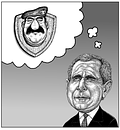


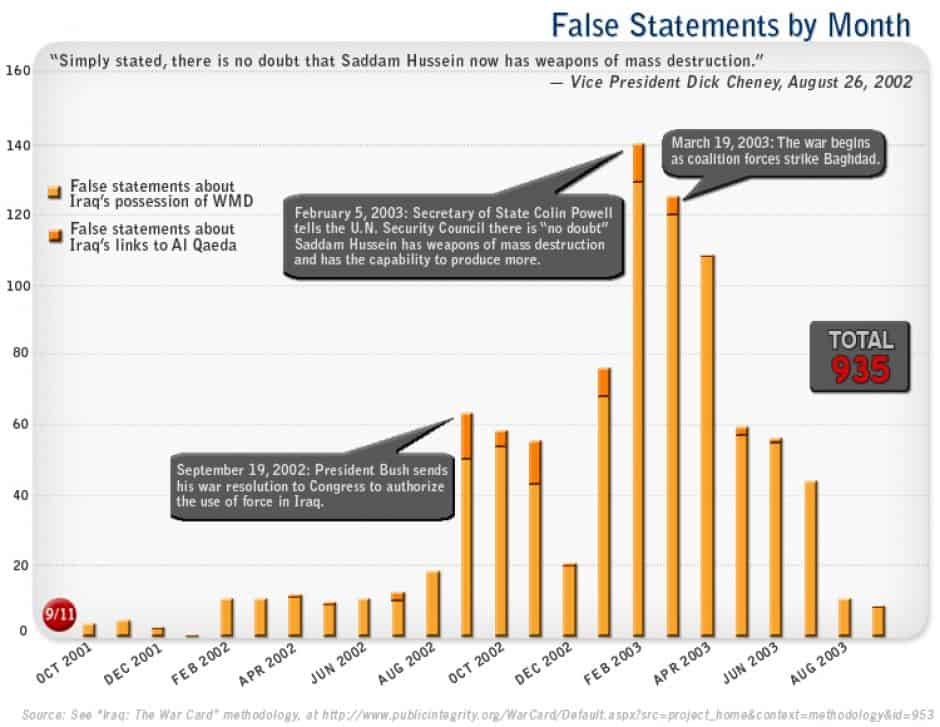
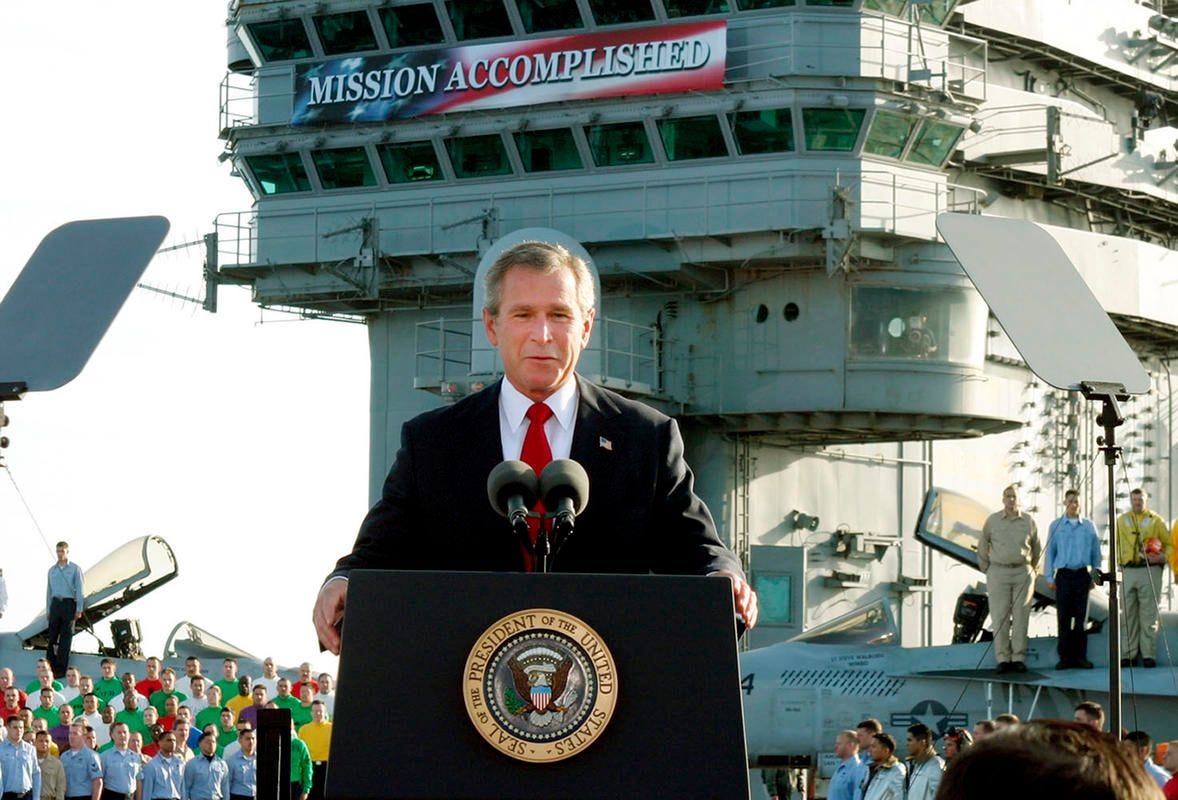

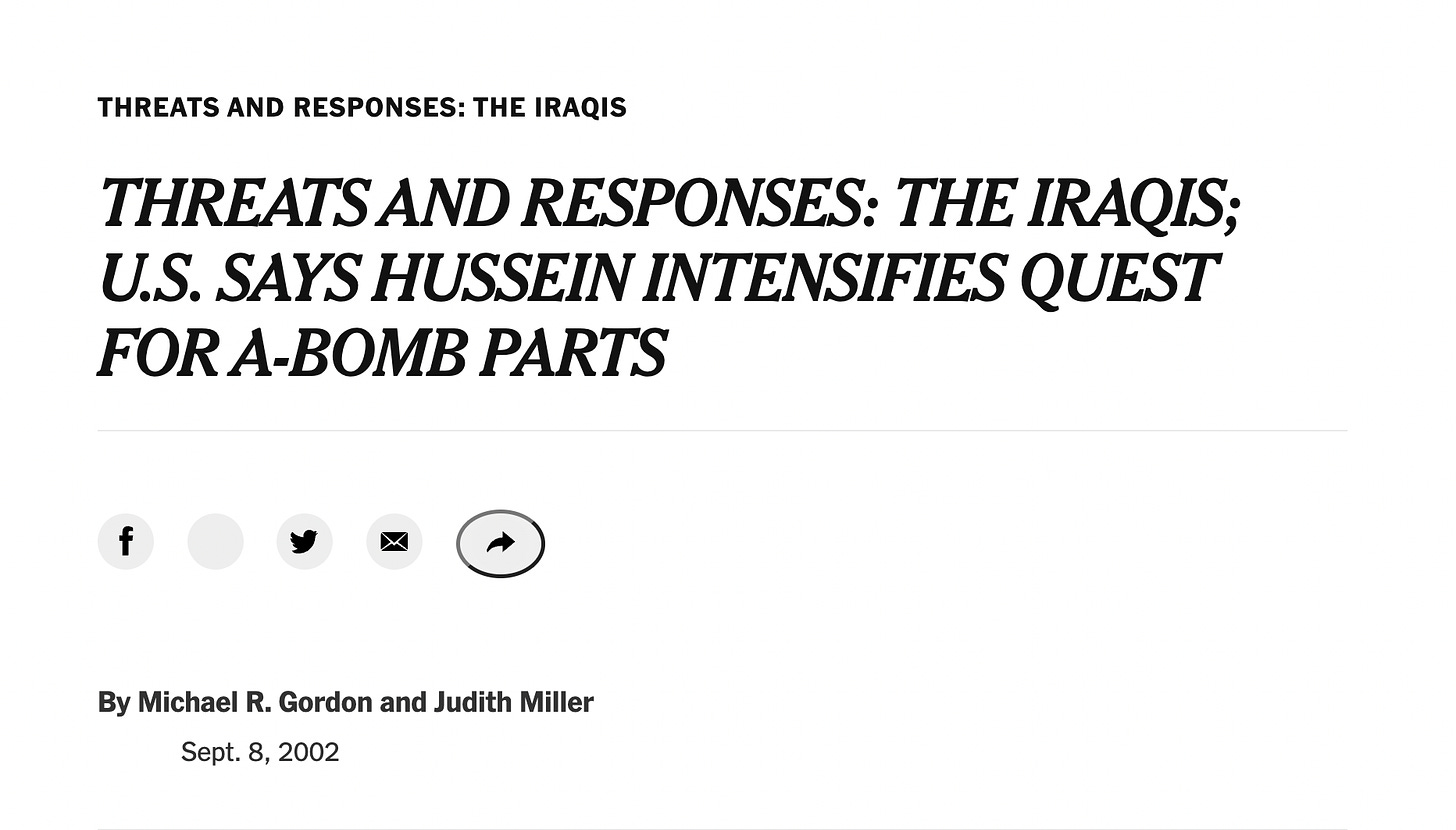
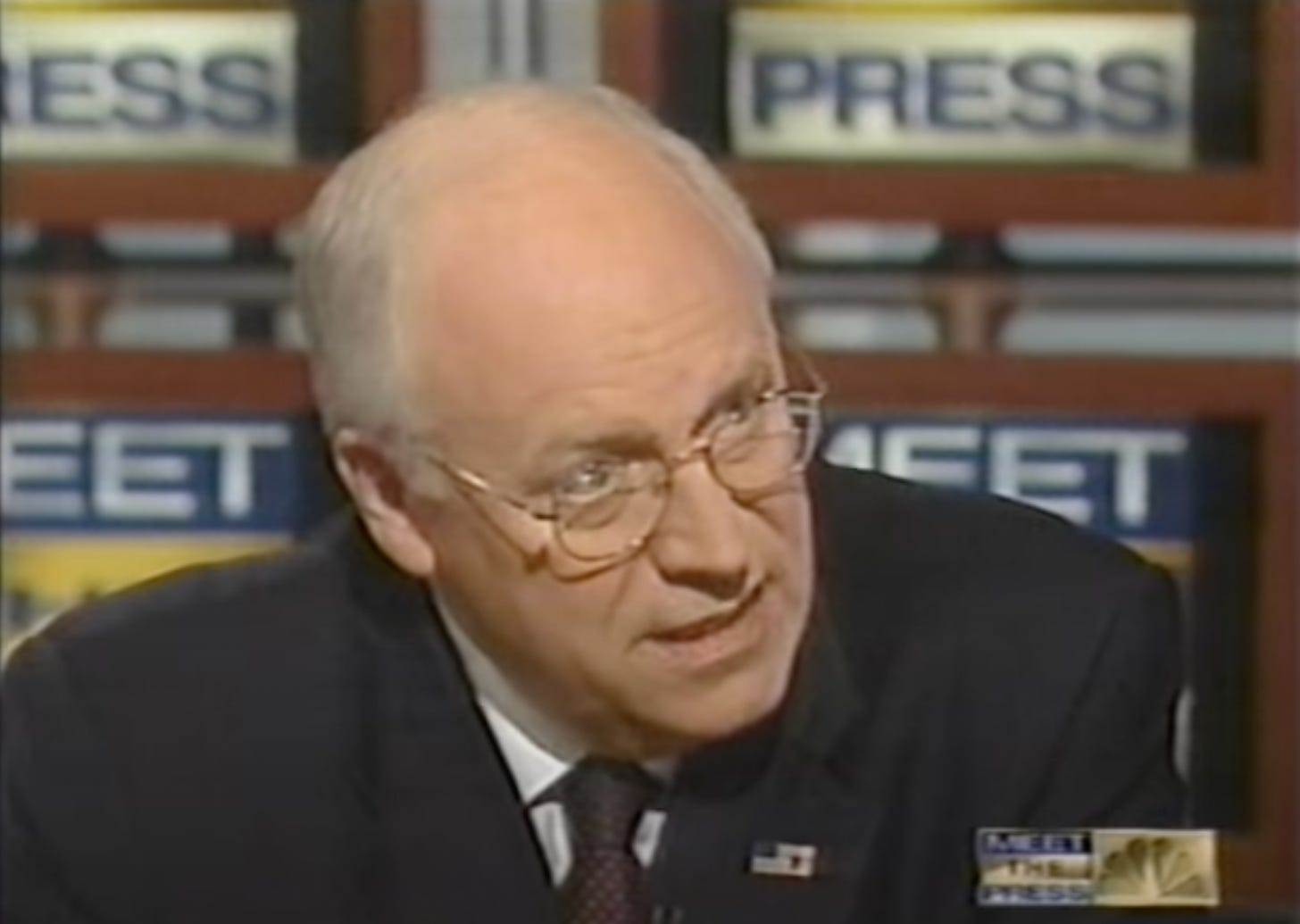
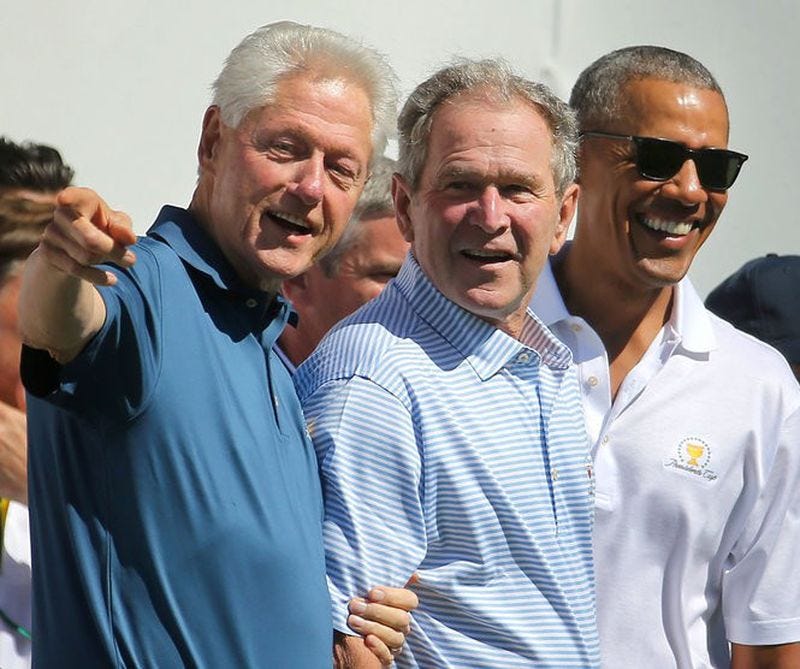

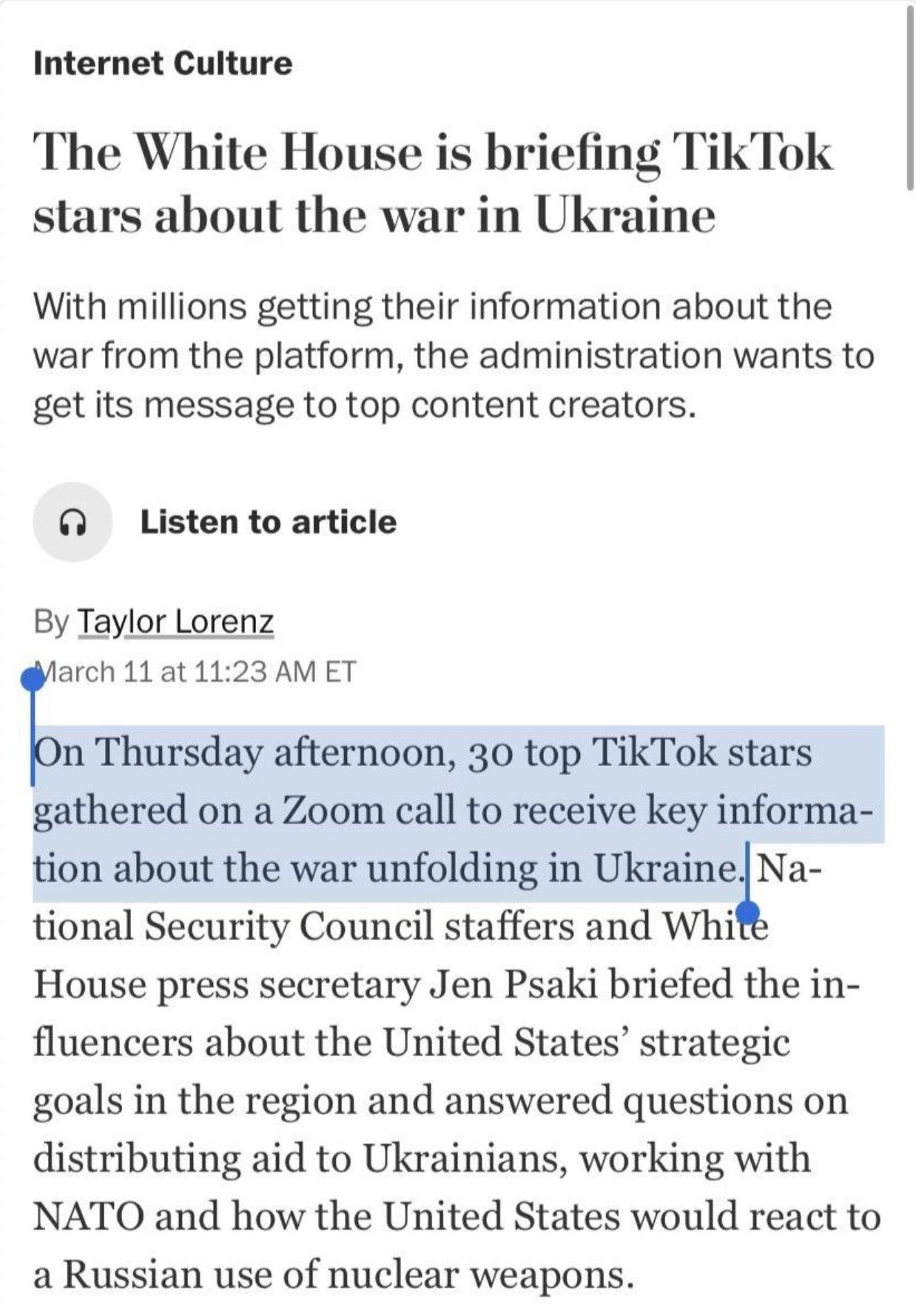

Great comprehensive essay on the "real" truth behind the mainstream beliefs. The numerous supporting links to articles and interviews that I never knew existed show your incredible dedication to actual research.
“Outright lies” over time become “we were wrong” and “better safe than sorry”. They are never labeled liars, as that is the secret to their longevity and legacy.